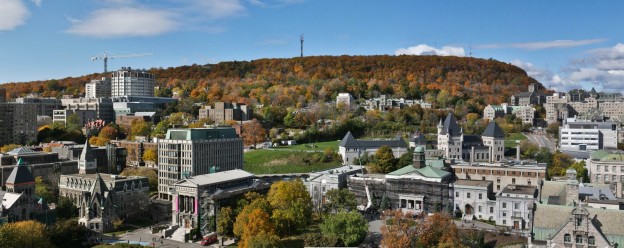By Drew Bush

Renee Sieber, associate professor in McGill University’s Department of Geography and School of Environment.
Part 2 (of 2). This is the second in a two part series with the head of Geothink.ca, Renee Sieber, an associate professor in the Department of Geography and School of Environment at McGill University. In this second part, we pick up the story of how Sieber sees civic participation in North America during an age of technological change. Catch Part 1 here if you missed our coverage of Geothink itself; its vision, goal and design.
Talking with Renee Sieber means finding exuberance and excitement for each of Geothink.ca’s projects and the work of all the team members, collaborators and partners. One place to start such a conversation is with how many cities make information available to the public.
“Cities are also publishing enormous amounts of data—it’s called open data,” Sieber, Geothink’s head and an associate professor at McGill University, said. “And this data can be turned into applications that for example can allow citizens to more easily know when they should put their recycling out and what types of recycling [exist], where there is going to be traffic congestion or traffic construction, when the next city council meeting will be held and what will be on the city council agenda.”
This open data forms the basis for how many modern technologies use programs to simplify and facilitate citizen interactions with city garbage services, transportation networks or city policies and processes. In particular, one Geothink project aims to interrogate how standards are created for open data—no easy thing, according to Sieber, when you’re talking not just about abstract data but even more abstract metadata.
“So why should one care about that?” Sieber asked. “Well, we should care about that first of all because the reason that people can now get up-to-date transit information in cities all over North America and, indeed, cities all over the world is because of a very small open data standard called GTFS, the General Transit Feed Specification.”
This prototype successful standard (or way of structuring public transportation data) resulted from a partnership between Google and Portland, Oregon. And, according to Sieber, it’s not about visualizing the data but standardizing its structure so that it can be used in equations that allow cities to show when the next bus will arrive, the best ways to get from point x to point y, and to put all this information on a map. In fact, Open511, a standard for traffic and road construction, explicitly styles itself after this prototype.
“It’s really interesting for us to figure out what new data standards will emerge,” added Sieber. “For example, will there be one to show traffic construction all over the country or all over North America?”
Yet it marks only one way Geothink is examining citizen interactions with cities. At Ryerson University, Associate Professor Pamela Robinson is working on examining civic hackathons where cities bring together techies and interested citizens to find innovative ways to design and build applications for city data and improve city services. The problem, according to Sieber, is that after the hackathons many such applications or proofs of concepts disappear. For example, some recent winners of a hackathon in the United Kingdom felt that too many applications end up up in the back alleys of BitBucket or GitHub.
“So it can be a quite frustrating experience,” Sieber said. “And cities and the participants alike look towards ways to try to retain that enthusiasm over time and to build on the proofs of concept to actually deploy the apps. So Pamela is conducting research on how to create that technological sustainability.”
In yet one other project, Geothink has partnered with the Nova Scotia Government’s Community Counts program located in Halifax, Nova Scotia to study the preferences of end-users from community-based management organizations or non-profits who utilize the open data from the province. Community Counts’s mission is to make it easier for such organizations to use information such as socio-demographic data, although the organization itself just lost funding in the province’s most recent budget.
“This is very different from working with apps from open data because with apps you generally know who the developers are but you don’t know who the end-users are,” Sieber said. “So we are conducting a project with them to ask questions of the end-users to find out what they find valuable or challenging in using data. And we’ll then infer that to the challenges and opportunities of working with open data that cities produce.”
So how does all this reflect on what civic participation means today in North America? Governments can now know if you visit certain parks, go to certain places for coffee, and meet certain friends while doing either. So, theoretically at least, they can now design urban spaces and cities themselves to be safer, more vibrant, and better suited to the range of activities taking place in these places.
“That seems both incredibly convenient and incredibly Orwellian at the same time,” Sieber said. To find out more about her views of civic participation, stay tuned for our next Geothoughts Podcast by signing up to receive it on iTunes.
If you have thoughts or questions about this article, get in touch with Drew Bush, Geothink’s digital journalist, at drew.bush@mail.mcgill.ca.
